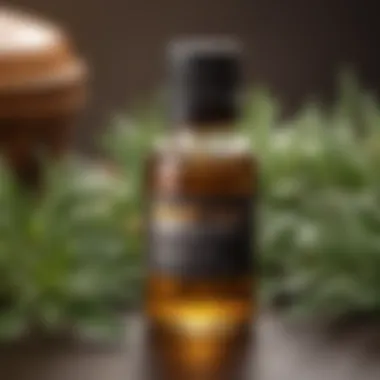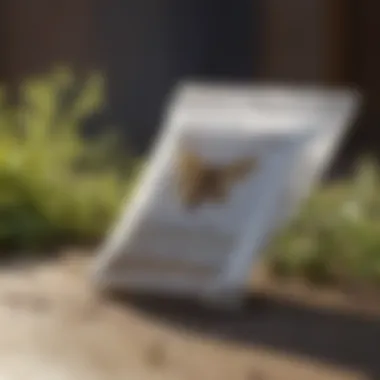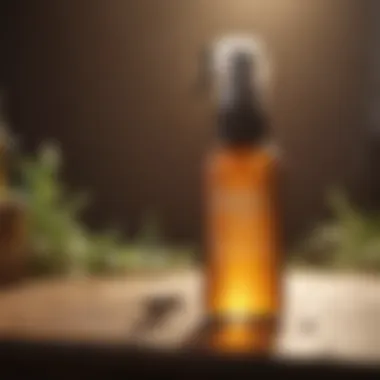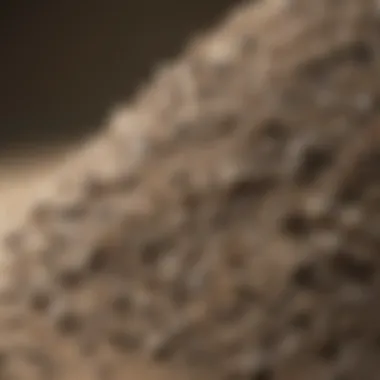Effective Natural Remedies for Fleas in Your Home Without Harsh Chemicals


Preventive Pest Control Strategies
When it comes to effectively managing fleas in your home, preventive measures play a vital role in keeping these pesky pests at bay. Starting with House Exterior Protection, it is essential to focus on sealing cracks around the exterior of your house to prevent fleas from finding their way inside. Clearing debris in your yard is also crucial as it eliminates potential breeding grounds for fleas. Additionally, taking steps to prevent pests from entering your home, such as installing door sweeps and repairing screens on windows, can significantly reduce the risk of flea infestations.
Yard Maintenance is another key aspect of flea prevention. By maintaining essential yard care routines like mowing the lawn regularly and removing stagnant water sources, you can create an environment that is less hospitable to fleas. Implementing methods for keeping your yard pest-free, such as using natural repellents like cedar chips or diatomaceous earth, can further deter fleas from taking up residence in your outdoor space.
Indoor Cleanliness is paramount when it comes to combating fleas. Expert cleaning tips and techniques, including vacuuming regularly, washing pet bedding in hot water, and sweeping and mopping floors with a diluted vinegar solution, can help limit flea populations indoors. By maintaining a pest-resistant indoor environment through proper sanitation practices, you can minimize the potential for flea infestations.
Efficient garbage disposal is also essential in flea control. By adopting proper waste disposal methods like securely sealing garbage bags and using lidded trash cans, you can prevent attracting fleas to your property. Emphasizing the importance of proper garbage disposal not only keeps your environment clean but also reduces the likelihood of flea infestations. Additionally, exploring other pest prevention strategies such as implementing natural barriers like plant borders and using deterrent plants in your garden can add an extra layer of protection against fleas and other pests.
In essence, by incorporating these Preventive Pest Control Strategies into your household routine, you can proactively address and mitigate the risk of flea infestations, fostering a pest-free living environment for you and your family.
Understanding Fleas
When delving into the realm of natural remedies for flea infestation in homes, it is crucial to first grasp a solid understanding of these pesky parasites. Fleas, commonly known as external parasites, thrive on warm-blooded animals, feeding on their blood to survive. Understanding the lifecycle of fleas is essential as it sheds light on how these creatures develop and infest homes, wreaking havoc on both pets and humans. By comprehending the lifecycle stages of fleas, individuals can effectively combat infestations using targeted methods tailored to each stage. This section aims to provide a detailed insight into the lifecycle of fleas, equipping readers with the knowledge needed to tackle these pests effectively.
Lifecycle of Fleas
Egg Stage
The Egg Stage marks the beginning of the flea lifecycle, where adult female fleas lay eggs on their host, usually a pet like a dog or cat. These tiny, white eggs are often laid in batches, usually falling off the host onto carpets, bedding, and furniture. Eggs typically hatch within 2 days to 2 weeks, depending on environmental conditions like temperature and humidity. Due to their small size and smooth texture, flea eggs can easily roll off and settle into crevices, making them challenging to detect and remove effectively without targeted approaches.
Larva Stage
As eggs hatch, they give rise to larvae that emerge hungry and seek out organic debris and adult flea feces for sustenance. Larvae are legless and exhibit a distinct segmented appearance, blending seamlessly into their surroundings to avoid predators. During this stage, larvae go through molting several times before spinning cocoons for pupation. Larvae are particularly resilient and adaptable, thriving in dark, humid environments, such as carpets, bedding, and upholstery, making them elusive and challenging to eradicate completely.
Pupa Stage
The Pupa Stage is a crucial transitional phase in the flea lifecycle, where larvae undergo metamorphosis within protective silk cocoons to develop into adult fleas. Pupae are encased in cocoons bound by strong silk fibers, providing insulation and protection from external threats while they transform. Pupae are remarkably resilient and can remain dormant for weeks to months, awaiting ideal conditions to emerge as adult fleas. Due to their resilient nature and protective cocoons, pupae pose a significant challenge in flea control efforts, requiring persistence and strategic intervention to disrupt their development.


Adult Stage
Upon completion of metamorphosis, adult fleas emerge from their cocoons ready to feed and reproduce, perpetuating the infestation cycle. Adult fleas possess specialized mouthparts for piercing the host's skin and consuming blood for nutrition and reproduction. These agile insects are capable of jumping great distances and have a rapid reproductive capacity, enabling them to establish sizable populations swiftly. Identifying and eliminating adult fleas is crucial in controlling infestations, as these stages are responsible for continuous reproduction and host discomfort, making targeted treatment essential for effective flea management.
Preventive Measures
When it comes to dealing with fleas in your home, preventive measures play a crucial role in maintaining a flea-free environment. By implementing a regular cleaning regimen and using natural repellents, you can effectively combat fleas without the need for harsh chemicals. Preventive measures not only help in eradicating existing flea infestations but also act as a barrier against future infestations, ensuring the health and well-being of your pets and family.
Regular Cleaning Regimen
In the fight against fleas, a regular cleaning regimen is essential to eliminate flea habitats and disrupt their life cycle. Vacuuming the carpets, upholstery, and other surfaces helps to remove fleas, eggs, and larvae, reducing the infestation. Washing pet bedding in hot water weekly is another crucial step in preventing fleas from taking hold in your home. Decluttering your living spaces minimizes hiding spots for fleas and makes it easier to spot and eradicate them.
Vacuuming
A key aspect of the cleaning regimen is vacuuming, as it physically removes adult fleas, eggs, and larvae from carpets and furniture. Regular vacuuming not only picks up adult fleas but also disrupts their life cycle, preventing further infestation. Vacuuming is a popular choice for flea control as it is non-invasive and helps maintain hygiene in your home.
Washing Pet Bedding
Washing pet bedding in hot water at least once a week effectively kills fleas and their eggs. This practice not only helps to eliminate existing fleas but also prevents their return. Clean bedding reduces the risk of re-infestation, keeping your pets comfortable and free from flea bites.
Decluttering
Decluttering plays a significant role in flea prevention by reducing hiding spots and breeding areas for fleas. Removing unnecessary clutter from floors, furniture, and closets makes it easier to spot and treat flea infestations. A clutter-free environment is less hospitable to fleas, reducing the likelihood of infestations.
Natural Repellents
Natural repellents offer a chemical-free alternative to controlling fleas in your home. These remedies are safe for pets and humans while effectively repelling and killing fleas. Diatomaceous Earth, essential oils, and herbal sprays are powerful natural repellents that target fleas without harsh chemicals.
Diatomaceous Earth


Diatomaceous Earth is a natural powder that dehydrates and kills fleas on contact. Its abrasive texture damages the exoskeleton of fleas, leading to dehydration and death. Diatomaceous Earth is a popular choice for flea control due to its effectiveness and non-toxic nature.
Essential Oils
Essential oils like lavender, peppermint, and cedarwood have insect-repelling properties that can deter fleas. These oils can be diluted and applied to pet bedding, carpets, and furniture to repel fleas. Essential oils offer a natural and pleasant-smelling alternative to chemical insecticides.
Herbal Sprays
Herbal sprays containing ingredients like neem, eucalyptus, and citrus oils are effective in repelling fleas from your home. These sprays can be used on pet bedding, upholstery, and carpets to create a barrier against fleas. Herbal sprays offer a non-toxic and eco-friendly solution to flea infestations.
Home Remedies for Fleas
In this comprehensive guide to natural remedies for fleas in a household, the section on Home Remedies for Fleas plays a crucial role. Instead of resorting to harsh chemicals, opting for home remedies provides a safer alternative that is effective in combating flea infestations. Home remedies are not only environmentally friendly but also pose minimal risk to pets and children in the house. They offer a holistic approach in addressing flea problems, focusing on eradicating fleas at their source and preventing future infestations. By understanding and utilizing home remedies, individuals can maintain a clean and flea-free living environment.
Apple Cider Vinegar Spray
Apple cider vinegar spray is a popular natural remedy for fleas due to its acidity, which repels these pests effectively. To create this spray, mix equal parts of apple cider vinegar and water in a spray bottle. After thoroughly cleaning the affected areas, spray the solution generously on carpets, furniture, and pet bedding. The strong scent of apple cider vinegar not only deters fleas but also acts as a disinfectant, making it a versatile and multipurpose solution for flea control. Regular application of this spray can help in keeping fleas at bay and maintaining a flea-free home environment.
Salt Treatment
Salt is a simple yet effective remedy for tackling fleas as it acts as a desiccant, drying out these unwanted parasites. To use salt as a flea treatment, sprinkle a generous amount of finely ground salt on carpets, rugs, and areas frequented by pets. Leave the salt to sit for a few hours or overnight before vacuuming it up thoroughly. Salt not only dehydrates adult fleas but also targets flea eggs and larvae, disrupting their life cycle. Consistent application of salt treatment can help control flea populations in the home and prevent reinfestation.
Lemon Spray
Lemon spray is a refreshing and natural solution for repelling fleas from home surroundings. To make lemon spray, boil a pot of water with sliced lemons and allow it to cool overnight. The citrusy scent of lemons acts as a deterrent to fleas while leaving a pleasant aroma in the house. After straining the solution, pour it into a spray bottle and apply it to pet bedding, carpets, and areas where fleas are present. Lemon spray offers a non-toxic and aromatic alternative to chemical flea treatments, providing an effective method for controlling flea infestations and protecting your home from these pesky parasites.
Essential Oils for Fleas
In the realm of combating fleas naturally, essential oils play a pivotal role. These potent extracts are known for their effective pest-repelling properties, making them a popular choice for those seeking alternative solutions to flea infestations. Essential oils offer a more organic and gentle approach compared to traditional chemical-laden treatments. They not only deter fleas but also leave a pleasant aroma in your home, creating a serene environment free from these pesky parasites. Let's delve deeper into the specific elements, benefits, and considerations surrounding essential oils for fleas.


Lavender Oil
Lavender oil is revered for its calming scent and robust flea-repelling capabilities. This versatile essential oil is a natural insecticide, effectively warding off fleas while soothing your senses with its delightful fragrance. When applied correctly, lavender oil acts as a potent deterrent against fleas without the harsh side effects of synthetic chemicals. Its gentle nature makes it suitable for household use, ensuring a safe and pleasant experience for both residents and pets. With its multi-faceted benefits, lavender oil stands out as a go-to option for natural flea control.
Peppermint Oil
Peppermint oil emerges as a dynamic player in the realm of natural flea remedies. Beyond its refreshing aroma, this essential oil possesses strong insect-repelling properties, making it a valuable asset in the fight against fleas. Peppermint oil acts as a natural deterrent, keeping fleas at bay without posing any harm to pets or humans. Its minty freshness not only masks odors but also serves as an effective barrier against flea infestations. By incorporating peppermint oil into your pest control regimen, you can create an unwelcoming environment for fleas, promoting a flea-free home.
Cedarwood Oil
Cedarwood oil exudes a woody aroma that not only delights the senses but also repels fleas with finesse. This essential oil serves as a potent insecticide, targeting fleas and other pests effectively. Cedarwood oil's strong scent acts as a natural deterrent, disrupting the sensory receptors of fleas and deterring them from inhabiting your living spaces. Additionally, cedarwood oil is a safe alternative to chemical treatments, offering a natural yet powerful solution for combating flea infestations. By harnessing the benefits of cedarwood oil, you can establish a protective shield against fleas, safeguarding your home with efficacy and elegance.
Natural Flea Traps
Natural flea traps play a crucial role in combatting flea infestations within your home. These traps are essential elements in your arsenal against these pesky parasites, offering effective and environmentally friendly solutions to rid your living space of fleas. By understanding the various types and benefits of natural flea traps, you can take proactive steps to control and eliminate these unwanted intruders.
Dish Soap Trap
The dish soap trap is a simple yet highly effective method for trapping and killing fleas in your home. To create this trap, mix warm water with dish soap in a shallow dish or bowl and place it in flea-infested areas. The soapy solution acts as a sticky agent that traps fleas upon contact, preventing them from escaping. Position these traps near areas where fleas are commonly found, such as pet bedding or carpeted areas. Check the traps regularly and replace the solution as needed to maintain their effectiveness.
Light Trap
Light traps offer a non-toxic and efficient means of capturing and eliminating fleas in your home. These traps attract fleas with a light source, such as a lamp or flashlight, coupled with a bit of soapy water below the light. The fleas are drawn to the light and then land in the soapy water, becoming trapped and unable to escape. Placing these traps in dark and isolated areas where fleas congregate can help reduce their populations effectively. Regularly clean and replenish the soapy water in the trap to maximize its flea-catching potential.
Consulting a Professional
As we delve into the realm of natural remedies for fleas in the home, there comes a juncture where seeking professional assistance becomes indispensable. Consulting a professional pest control service can offer a myriad of benefits when combating flea infestations effectively. These experts bring with them a wealth of experience, intricate knowledge, and specialized tools that can address the issue with precision and efficiency. Their tailored approach ensures that each infestation is treated uniquely, taking into account factors such as the severity of the problem, the type of dwelling, and any specific needs or concerns of the occupants. Collaborating with professionals also minimizes risks associated with handling chemicals or DIY treatments, safeguarding both the property and its inhabitants from potential harm.
When to Seek Professional Help
Knowing when to seek professional help for flea infestations is crucial in preventing the situation from escalating. While home remedies and natural solutions can be effective to a certain extent, there are instances where the infestation is beyond control. If the population of fleas seems to be increasing despite implementing preventive measures, or if the problem persists despite repeated attempts at eradication, it may be time to enlist the expertise of professional pest control services. Additionally, individuals with sensitivities to flea bites or those living in multi-pet households may require professional intervention to ensure the eradication of fleas and the prevention of reinfestation. By recognizing the signs that home remedies are insufficient, homeowners can act promptly in seeking professional help, thereby safeguarding their living environment and the well-being of their furry companions.
Importance of Professional Pest Control
The importance of professional pest control in addressing flea infestations cannot be overstated. These experts bring a level of precision and efficacy that surpasses traditional methods of flea removal. By conducting thorough inspections, professional pest control technicians can identify the root cause of the infestation and devise targeted strategies to eradicate fleas at all stages of their lifecycle. Their knowledge of insect biology and behavior equips them to implement treatments that are not only effective but also pose minimal risk to humans and pets. Furthermore, professional pest control ensures long-term results, preventing reinfestation and providing homeowners with peace of mind.



